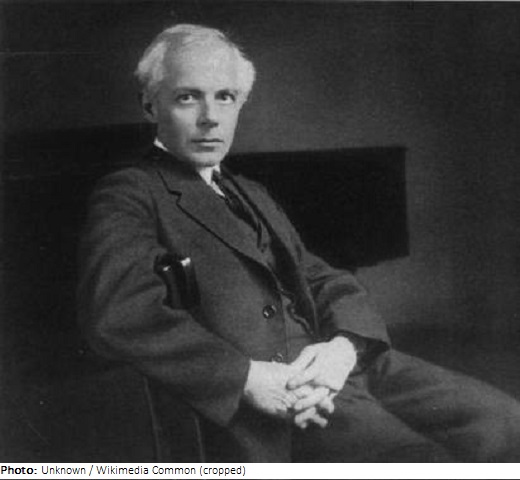Béla Bartók

Biographical information
| Roles | Referee |
|---|---|
| Sex | Male |
| Full name | Béla Viktor Janós•Bartók |
| Used name | Béla•Bartók |
| Born | 25 March 1881 in Sânnicolau Mare, Timiș (ROU) |
| Died | 26 September 1945 (aged 64 years 6 months 1 day) in New York, New York (USA) |
| NOC |  Hungary Hungary |
Biography
Béla Bartók received his first piano lessons from his mother. In 1894, the family moved to Pressburg (now Bratislava), where he received further tuitions in piano and harmony. From 1899-1903, he studied at the Royal Academy of Music in Budapest.
Early on Bartók developed an interest in folk music, especially that from Hungary, but also Romania and Slovakia. In 1907 he assumed the professorship for piano at the Royal Academy. He made a trip to North Africa in 1913, again in search of folk music. During the short-lived First Hungarian Republic, Bartók was deputy director of the Academy of Music.
As a composer, Bartók was fascinated by modern French composers. The basis of his music remained tied to tonality, but he stretched it to its limits. The asymmetrical rhythms were reminiscent of Slavic folk music. With his melodic figures, he approached atonality without ever really using the twelve-tone technique.
Bartók was a brilliant pianist, who frequently gave concerts with his second wife, Ditta Pasztory (1903-1982). In the late 1920s, he gave concerts in the USA as well as in the USSR. He gave up his position at the Hungarian Academy of Music in 1934 but continued to work scientifically in ethnomusicological research. In addition, he was intensively engaged in the musical education of children.
Because of the outbreak of World War II, Bartók went to the USA in 1940, where he spent the rest of his life. From Columbia University, he was awarded an honorary doctorate. There, he continued his research on folk songs and composed his last completed work, the later popular Concerto for Orchestra. In addition to orchestral music, he wrote operas (Bluebeard’s Castle), ballets, chamber music, and numerous piano works.
Throughout his life, Bartók was in financial difficulties, though he exaggerated them at times. At least he had a financial supporter in America in pianist Elizabeth Sprague Coolidge (1864-1953). Only after his death of leukemia did performances and recordings increase significantly. 43 years after his death, his remains were transferred from Hartsdale, N.Y., to Budapest, where he was honored with a state funeral.
Referee
| Games | Sport (Discipline) / Event | NOC / Team | Phase | Unit | Role | As | |
|---|---|---|---|---|---|---|---|
| 1924 Summer Olympics | Art Competitions |  HUN HUN |
Béla Bartók | ||||
| Music, Open (Olympic) | Final Standings | Judge |